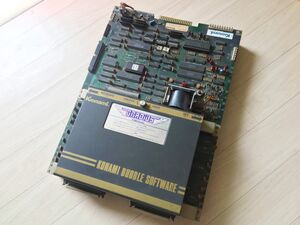Konami Bubble System
- For more information, see this article's corresponding Wikipedia page: Bubble_System.
| This device is in the WorkNeeded:OriginalParts category because it was flagged as missing information on the original parts. It may have replacement parts listed but those cannot be assumed to be identical to the originals. If you have a list of the original parts, please feel free to add them by copying the relevant table from EditorsToolbox:Tables |
| This device is in the WorkNeeded:General category because it was flagged as missing general information about the device. The information may be incomplete, using default text, or inaccurate and should be verified with external sources if possible. If you can add or correct information on this page, please feel free to edit it and do so. |
The Konami Bubble System (Also known as the Konami GX400) is a 16-bit arcade machine platform produced by Konami in the 80s. Unlike it's contemporaries, the Bubble System utilized bubble memory technology in favor of floppies, silicon-based ROMs, or hard disk storage. The system is known for it's boot screen and music ("Konami Morning Music") as well as the original platform for iconic video game franchises such as Gradius and Twinbee.The system was a commercial failure for being more expensive than existing ROM-based systems and the obsolescence bubble memory chips.
| Preliminary Information | |
|---|---|
| Release Year | 1984 |
| Mounting Technology | Through Hole |
| Capacitor Types | Electrolytic, Ceramic |
| Hardware Specifications | |
| CPU | Main CPU: HD68000P8K (Motorola 68000) @ 9.216 MHz Sound CPU: NEC D780-1 (Zilog Z80) @ 3.579545 MHz |
| Memory Capacity | Program RAM: 128K Total (4K SRAM + 124K DRAM)
Bubble Memory / Program ROM: 2 MB (x2 Fujitsu FBM54DB 1 MB) BIOS: 64 KB EPROM |
| Graphics | 256x224 Resolution,
Supports sprite scaling, Supports up to 256 sprites |
| Sound | x2 General Instruments AY-3-8910 PSG (Programmable Sound Generator),
x1 Konami K005289 WSG (Waveform Sound Generator), x1 Sanyo VLM5030 Voice Synthesizer |
Known Issues
The Konami Bubble System is known for being particularly fragile and highly sensitive to electromagnetic interference. If the system is subject to strong magnetic interference (ex. Unshielded CRTs or Speakers) the cartridge will likely be irreparably damaged.
"Program ROM BAD"
Causes
- The Bubble Software cartridge is corrupt.
- The game failed to load correctly.
Solutions
- Reseat the Bubble Software cartridge.
- Replace/restore Bubble Cartridge with a Bubbless cartridge and/or ROM dump of installed game.
System does not boot
Causes
- Faulty RAM.
- Bad BIOS ROM.
- Reset circuitry is malfunctioning or damaged.
- Corrupt Bubble Memory Cartridge.
- Bubble Memory Controller is faulty/damaged.
Solutions
- Replace DIP RAM chips with equivalent SRAM/DRAM.
- Replace DIP BIOS ROM chip with a freshly burnt EPROM using the bubsys BIOS.
- Check 74-series logic chips near Bubble Memory Controller using a logic probe. [1]
- Replace/restore Bubble Cartridge with a Bubbless cartridge and/or ROM dump of installed game.
- Replace Bubble Memory Controller (if possible).
Audio doesn't sound right
Causes
- Malfunctioning / Faulty AY-3-8910 chips.
- Malfunctioning / Faulty K005289 chip.
Solutions
- Replace DIP AY-3-8910 chips with working old stock or modern AY-3-8910 compatible chips
- Replace DIP K005280 chip (if possible).
No spoken countdown or spoken speech in games
Causes
- Faulty VLM5030 chip.
- Voice volume potentiometer is set too low.
Solutions
- Replace DIP VLM5030 chip (if possible).
- Tune the voice volume potentiometer until spoken countdown can be heard.
"Warming up now" screen is corrupt
See example here.[2]
Causes
- Faulty / bad RAM.
- Possible glitch.
Solutions
- Replace DIP RAM chips with equivalent SRAM/DRAM.
- Allow the system to finish booting.
Disassembly Notes
Under no circumstances should the system be exposed to magnetic tools or unshielded magnetic components. Almost all Konami-branded components are virtually unobtainable, repair at your own risk.
Original Parts
Basic PCB Name
Note model numbers and board revisions here
| RefDes | Qty | Capacitance | Voltage | Mount | Diameter/Size | Height | Lead Spacing | Temp | Type | Brand | Series |
|---|---|---|---|---|---|---|---|---|---|---|---|
| 2 | 220 µF | 10V | Through Hole Radial | 0 °C |
Replacement Parts
Basic PCB Name
| RefDes | Qty | Compatible Part Number | Order Links |
|---|---|---|---|
| Digikey |
If parts are not available or different selection is preferred, you can use the values in the Original Parts section to perform a parametric search.
Related Links
- Bubble System Wiki (Use Translator) http://www.bubsys85.net/
